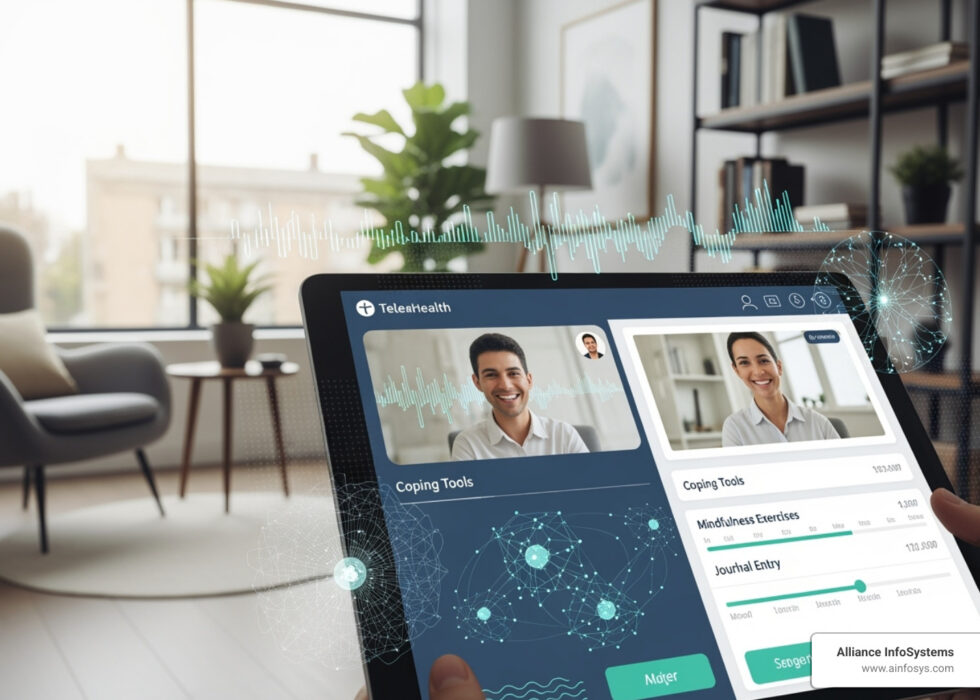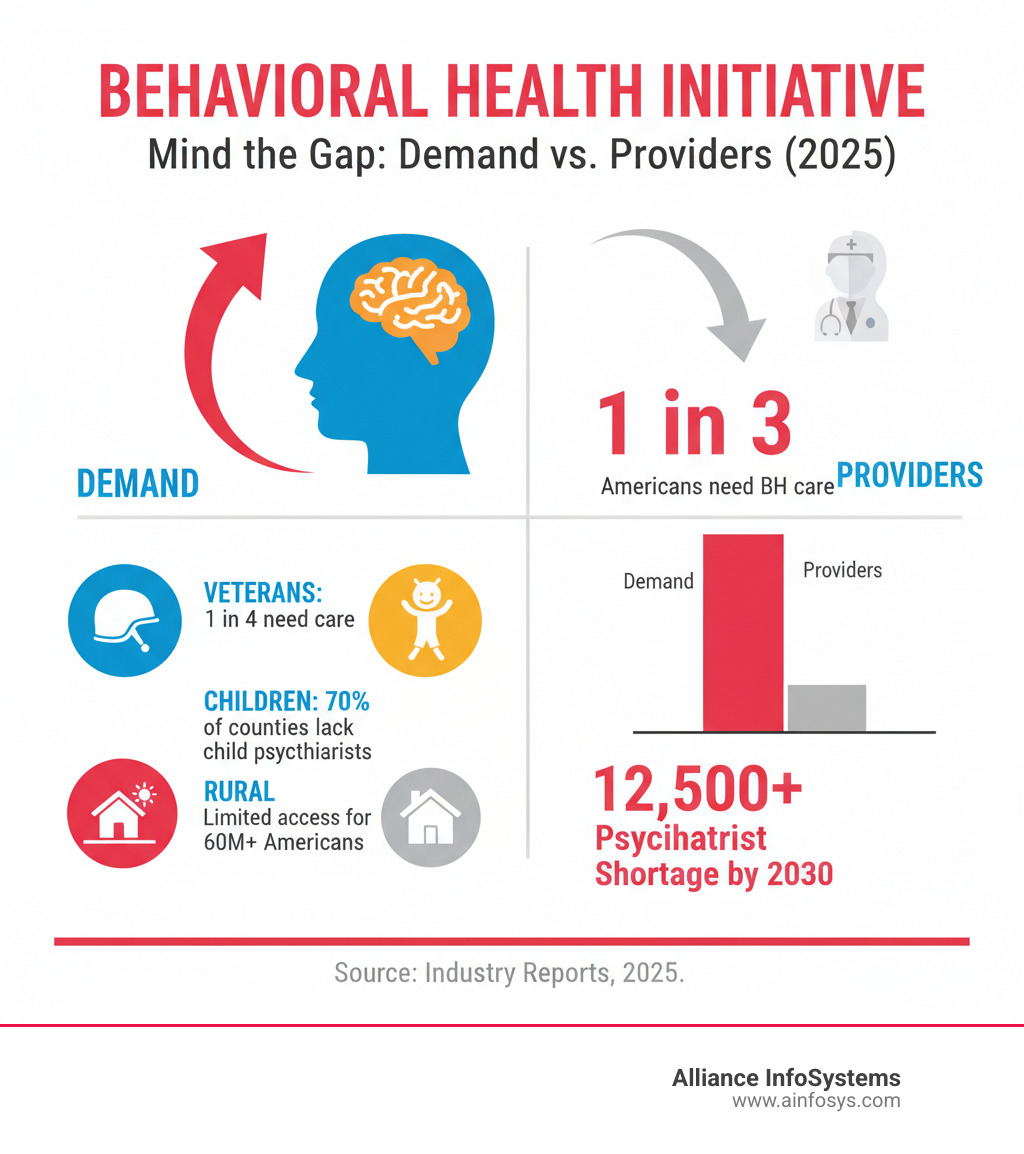Why Behavioral Health IT Services Are Critical for Modern Care Delivery
Specialized Behavioral Health IT Services help mental health and substance abuse providers manage operations, protect patient data, and deliver quality care. These solutions range from secure cloud hosting and cybersecurity to EHR support and telehealth platforms designed for behavioral health workflows.
Core Behavioral Health IT Services include:
- Managed IT Services – 24/7 network monitoring, server maintenance, and technical support
- Cybersecurity & Compliance – HIPAA-compliant security, ransomware protection, and regulatory adherence
- EHR & Clinical Systems – Support for specialized behavioral health electronic health records
- Telehealth Infrastructure – Secure platforms for virtual therapy and psychiatric consultations
- Data Analytics – Performance reporting and outcome measurement tools
- Cloud Services – Secure, scalable hosting for clinical applications and patient data
The demand for behavioral health services is exploding. Research shows that 1 in 3 Americans are expected to need behavioral health care, yet we face a critical provider shortage. The U.S. projects a shortage of 12,500 adult psychiatrists by 2030, and 70% of counties don’t have a practicing child psychiatrist.
This gap makes technology crucial. The right IT services help organizations serve more patients, reduce administrative burdens, and improve outcomes. However, choosing the wrong provider can lead to data breaches, compliance violations, and system failures that disrupt patient care.
Evaluating potential IT partners is crucial. You need a provider who understands both technology and the unique challenges of behavioral health.
1. Assess Core Technical Capabilities and Specialization
Finding the right IT partner for your behavioral health practice is like finding the right therapist—you need someone with technical skills who also understands your world. Look for a provider combining solid IT fundamentals with expertise in how behavioral health organizations work.
Way 1: Verify Foundational IT Management
Your technology infrastructure is the backbone of your practice. Without reliable, proactive IT management, clinicians can face frustrating system crashes or data loss.
The best Behavioral Health IT Services offer comprehensive, 24/7 managed IT support. This includes proactive 24/7 network monitoring, preventative server maintenance, and immediate technical support. For example, if your crisis hotline has network issues at 3 AM, managed services can detect and fix the problem before your staff even notices.
Modern practices need more than basic maintenance. Cloud infrastructure via services like Cloud Virtualization Services allows your team to securely access patient records and applications from anywhere—the office, home visits, or during telehealth sessions.
Data protection is critical. Robust Data Backup and Recovery services ensure patient data is safe and quickly restorable after a disaster like a cyberattack or hardware failure. You can’t afford to lose treatment notes or suffer days of downtime.
During busy periods or major upgrades, your internal IT team may need extra help. IT staff augmentation services like IT Augmentation provide temporary, skilled professionals without the commitment of a full-time hire.
If you’re new to managed IT services or want to understand what to expect from a provider, The Beginner’s Guide to Managed IT Services offers valuable insights for building a strong IT foundation.
Way 2: Confirm Specialization in Behavioral Health Workflows
Many IT providers know technology but not the reality of behavioral health practice. Generic IT support is insufficient for the unique challenges of mental health and substance abuse treatment.
A specialized IT partner understands that therapists need different tools than psychiatrists. They know group therapy requires specific documentation and that substance abuse treatment centers have added privacy requirements under 42 CFR Part 2. They are familiar with the needs of Applied Behavior Analysis practices, where precise data collection is essential.
This expertise is practical. When implementing a new EHR, a specialized provider knows which behavioral health-specific software features are useful, avoiding complex but valueless add-ons. They configure systems to support your workflows, not force you into generic templates.
The goal is reducing administrative burden so clinicians can focus on patient care, not technology. An IT partner who understands your workflows can implement solutions that improve provider efficiency, cut documentation time, and help prevent burnout.
Look for an IT provider who asks detailed questions about your practice: intake processes, therapy types, special populations, and billing/documentation workflows. This attention to nuance is the difference between helpful and hindering technology.
2. Scrutinize Security and Compliance Frameworks
When patients share their deepest struggles, they place immense trust in your organization. This trust extends to every system storing their information. In behavioral health, protecting patient data is about honoring that trust, not just following rules. The stakes are high: a single breach can destroy relationships and lead to devastating financial penalties.
Way 3: Investigate Comprehensive Cybersecurity Defenses
Behavioral health organizations are prime targets for cybercriminals because patient records contain highly sensitive information that is valuable on the dark web. Your Behavioral Health IT Services partner needs a robust cybersecurity strategy that goes beyond basic antivirus software.
They must understand your regulatory landscape. The HIPAA Security Rule is the foundation, but 42 CFR Part 2 adds specific protections for substance abuse records. These are strict legal requirements.
Your IT partner should provide robust ransomware protection to prevent system lockdowns and phishing prevention training for staff, as human error can undermine the best defenses. Endpoint security ensures every device meets security standards, while vulnerability management involves continuously scanning for and patching weaknesses.
For enterprise-level protection, look for partners offering Managed Security services. A Security Operations Center (SOC) provides 24/7 monitoring by experts who respond to threats in real-time. To learn more, check out What is SOC as a Service (SOCaaS)?.
Your Cybersecurity strategy must be as sophisticated as the threats you face. Anything less puts your patients and your practice at risk.
Way 4: Ensure Strict Adherence to Regulatory Compliance
While cybersecurity protects against threats, regulatory compliance ensures you meet legal obligations for data protection. Think of cybersecurity as your castle walls and compliance as the laws governing them.
The HIPAA Privacy Rule and HITECH Act govern patient information use, while state-level privacy laws can add more requirements. Your IT partner must understand this complex regulatory web.
A Business Associate Agreement (BAA) is non-negotiable. Any vendor handling patient data must sign this legal document, accepting responsibility for protecting it. If a provider won’t sign a BAA, it’s a major red flag.
Compliance audits and risk assessments are early warning systems. A good IT partner helps you identify vulnerabilities before they become violations, saving you from fines and reputation damage. Data governance policies establish clear rules for data access and must evolve with your practice and regulations.
For the latest guidance, your IT partner should be familiar with the Official guidance on Behavioral Health and Health IT from HealthIT.gov.
Compliance is an ongoing journey. Your IT partner should be your guide, navigating the complex regulatory landscape so you can focus on patient care.
3. Evaluate Support for Clinical and Patient-Facing Technologies
Modern behavioral health care extends beyond the clinic’s four walls. Technology has opened doors to new ways of delivering care, connecting with patients, and improving outcomes. This section explores how IT services enable modern care delivery.
Way 5: Confirm Support for Specialized EHR and Telehealth Platforms
Your Electronic Health Record (EHR) is the heart of your practice, but not all are equal. Generic medical EHRs often fall short for behavioral health providers who need specialized templates for group therapy, treatment plans, and medication management.
Specialized behavioral health EHRs are designed for your workflows. Your IT partner needs deep expertise in EHR integration to ensure compatibility with your other platforms. Interoperability—the ability for systems to communicate—is also crucial. When your EHR connects via a Health Information Exchange (HIE), you get a complete patient health picture, which is vital for coordinating care.
Telehealth is here to stay. Your IT partner must provide solid telehealth platform support for secure, reliable virtual care. Tools for telepsychiatry, therapy, or secure messaging must be compliant and user-friendly for both providers and patients. Secure provider collaboration tools also improve patient care dramatically. As the National Institute of Mental Health notes in its research on Technology and the Future of Mental Health Treatment, these digital tools are fundamental to effective care.
Way 6: Analyze Data Analytics and Patient Engagement Capabilities
Turn your practice’s data into actionable insights to improve patient care. Your IT partner should help you move beyond data storage to data understanding.
Data-driven outcomes help you understand which treatments work best. Analyzing patient data can reveal effective interventions for specific populations or identify at-risk patients. This supports population health management by tailoring services to community needs. Clinical productivity reporting offers visibility into your practice’s operations, identifying bottlenecks and opportunities to work smarter.
Modern patient portals are essential for engagement. Patients expect to schedule appointments online, access records, and communicate with providers. Digital intake forms replace tedious paperwork and reduce data entry errors. Patient education resources delivered through these platforms can be incredibly powerful, reinforcing the work you do in sessions.
This technology also plays a crucial role in addressing mental health stigma and improving accessibility. Patients hesitant to walk into a clinic may be more comfortable starting their journey online. As reports on Health IT adoption in behavioral health show, organizations investing in these technologies see improved outcomes and higher patient satisfaction.
4. Determine the Financial and Operational Value of Behavioral Health IT Services
When running a behavioral health practice, every dollar matters. Investing in quality Behavioral Health IT Services isn’t just an expense; it’s a smart financial decision for your organization’s future. This section outlines the business case for investing in a strategic IT partner.
Way 7: Calculate the Financial and Operational Return on Investment (ROI)
When shopping for an IT partner, don’t just look at the monthly price. You need to understand the Total Cost of Ownership (TCO). A cheaper IT solution may seem attractive, but system crashes lead to idle therapists, frustrated patients, and lost revenue. A quality IT partner prevents these costly disasters.
The real value comes from reducing administrative overhead. Automated systems free up staff time from scheduling, billing, and paperwork for patient care. Smooth billing cycles and maximized reimbursements have an immediate financial impact.
Employee retention is another huge, often overlooked factor. Reliable, efficient tools lead to happier staff who aren’t frustrated by technology. In a field with high burnout, this is critical. Happy staff stay, saving you thousands in recruitment and training costs.
Scalability for growth is also crucial. The right IT infrastructure grows with you, so you won’t need a complete overhaul when you add providers or locations. For insights on making smart technology investments, see our guide on Top IT Investments for 2025 Budget.
The beauty of working with an experienced partner like Alliance InfoSystems is that we understand these unique needs. With over 20 years in the business, we’ve helped practices serve diverse populations more effectively. Whether you’re providing secure telehealth options for veterans seeking mental health support or developing digital resources for wellness in First Nations communities, the right IT foundation makes it possible.
When you calculate the true ROI—reduced downtime, improved efficiency, better staff retention, and the ability to serve more patients—quality Behavioral Health IT Services don’t cost money. They make money while helping you create a bigger impact.
Frequently Asked Questions about Behavioral Health IT
How can technology improve patient access to behavioral health care?
Getting to a therapist appointment can be challenging due to work, childcare, and provider shortages—70% of U.S. counties lack a child psychiatrist. Many people cannot access traditional care.
Telehealth is a game-changer. Virtual visits allow patients to connect with providers from home, eliminating travel and time off work. This is especially powerful for rural communities. Patient portals also smooth the process, allowing patients to book appointments online, access resources, and communicate securely with their care team.
Most importantly, technology helps reduce stigma. The privacy of at-home care can encourage those hesitant to visit a clinic to seek help. Removing these barriers can save lives.
What are the benefits of using specialized EHR systems for behavioral health?
Generic medical EHRs are built for physical health, not the nuances of mental health care. A therapist’s documentation needs differ greatly from a cardiologist’s.
Specialized behavioral health EHRs understand this. They offer custom templates for therapy notes (e.g., BIRP, DAP, SOAP) and efficiently handle documentation for group therapy sessions. Treatment plan integration is another key benefit, linking goals to documentation for easier progress tracking.
For psychiatrists, robust medication management tools are crucial. Regarding compliance, specialized systems are built with 42 CFR Part 2 in mind, protecting substance use disorder records beyond HIPAA. These systems adapt to your workflow, whether for traditional therapy or Applied Behavior Analysis.
What are the emerging trends in behavioral health IT?
The future of Behavioral Health IT Services is exciting, with innovations that feel like science fiction becoming reality.
- Artificial Intelligence is changing documentation. AI assistants can help draft session notes or suggest interventions, giving clinicians more time with patients.
- Predictive analytics analyzes patient data to identify at-risk individuals, enabling proactive intervention.
- Digital therapeutics are clinically validated apps and software that deliver evidence-based therapeutic interventions.
- Wearable technology offers real-time data on a patient’s mental state by monitoring vitals like heart rate variability and sleep patterns.
- Virtual Reality therapy is promising for treating phobias, PTSD, and anxiety by allowing patients to work through fears in controlled virtual environments.
- A major push for interoperability aims to seamlessly connect behavioral health data with other healthcare systems for better, more coordinated care.
Conclusion
Finding the right Behavioral Health IT Services partner is more than a checklist. It’s about finding a partner who understands that behind the technology are real people needing support in their most vulnerable moments.
This guide covered seven ways to evaluate IT partners, from foundational IT management and understanding behavioral health workflows to non-negotiable comprehensive cybersecurity defenses and strict regulatory compliance. We also covered support for specialized EHR and telehealth platforms, the power of data analytics and patient engagement, and the financial and operational value of choosing the right partner.
Choosing an IT partner means choosing someone who will be there during your most challenging moments—system downtime, security threats, or expansion. You need a partner who understands technology and your mission.
At Alliance InfoSystems, we’ve spent over 20 years learning what makes Healthcare organizations tick, especially in behavioral health. We know that every minute your team spends wrestling with technology is a minute they can’t spend with patients. That’s why we focus on creating customized and cost-efficient solutions that work the way you work.
Your patients depend on you, and you should be able to depend on your technology. Don’t let inadequate IT support hold back your ability to make a difference.
Ready to take the next step? Contact us to learn more about our Behavioral Health IT Services and find how we can help secure and streamline your practice.








